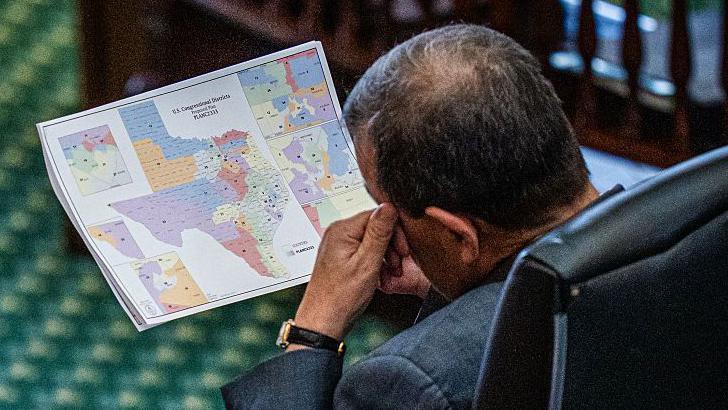US court blocks Texas from using newly redrawn voting maps

- Published
A US federal court has blocked Texas from using new voting maps drawn by Republicans in an effort to shore up their majority in the 2026 midterm elections.
The court said evidence indicated the new voting districts were "racially gerrymandered", and ordered the state to use the congressional lines they had in place before they redistricted earlier this year.
Republicans in the state legislature redrew voting districts mid-decade, sparking both Democrat and Republican-led states to follow suit and adjust their maps for a political edge ahead of next year's midterm elections.
Texas Governor Greg Abbott has filed an appeal against the ruling to the US Supreme Court.
Gerrymandering - the redrawing of electoral boundaries to favour a political party - is practised by both main parties and is legal unless ruled to be racially motivated.
Critics argue that the process allows politicians to pick their voters, rather than voters picking their elected officials.
The 2-1 ruling in Texas orders the state to set aside the newly approved maps, and instead use the ones created in 2021 by the Texas legislature.
"The public perception of this case is that it's about politics," US Judge Jeffrey Brown, a Trump appointee, wrote in the decision.
"To be sure, politics played a role in drawing the 2025 Map. But it was much more than just politics. Substantial evidence shows that Texas racially gerrymandered the 2025 Map."
The leader of the Democrats in the statehouse, Gene Wu, praised the ruling, saying in a statement that "a federal court just stopped one of the most brazen attempts to steal our democracy that Texas has ever seen".
"Greg Abbott and his Republican cronies tried to silence Texans' voices to placate Donald Trump, but now have delivered him absolutely nothing," said Wu.
Governor Abbott said in a statement that the ruling was "clearly erroneous and undermines the authority the U.S. Constitution".
"The Legislature redrew our congressional maps to better reflect Texans' conservative voting preferences – and for no other reason," said Abbott. "Any claim that these maps are discriminatory is absurd and unsupported by the testimony offered during ten days of hearings."
The maps voted through in August by the Texas legislature, and approved by the state's Republican governor, create five new Republican-leaning districts.
California voted to redraw its own maps earlier this month, leading to the creation of five Democrat-leaning seats.
Earlier this month, a judge in Utah rejected an electoral map drawn by Republican lawmakers and ordered the adoption of a new map that would create one Democrat-leaning district in the state.
Watch: What is gerrymandering? We use gummy bears to explain
Related topics
- Published11 November

